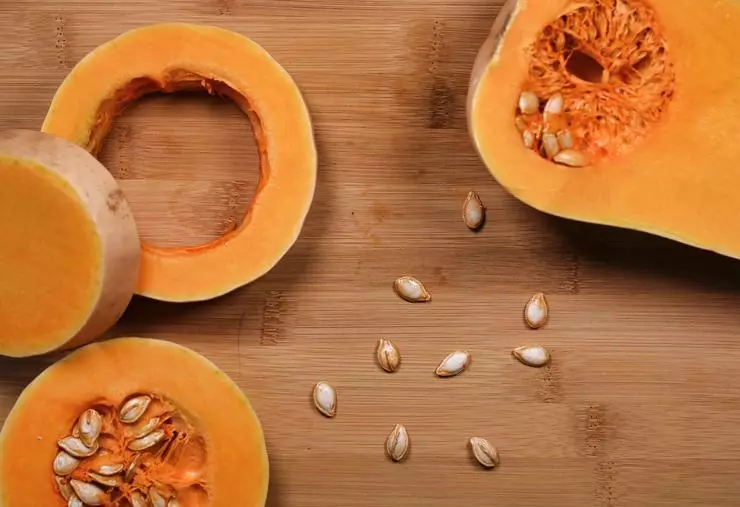Pumpkin seeds, albeit small, but they are full of valuable nutrients. Regular use of small amounts of them can provide you with a sufficient amount of useful fats, magnesium and zinc. Such an additive to salads, smoothies and caress can affect health heart, prostate and other organs, and also help reduce weight. Tell me why you need to eat a portion of pumpkin seeds.
Valuable nutrients
One oz (28 grams) of pumpkin seeds without a shell contains 150 calories, mainly consisting of fats and proteins. In addition, this portion will have to:
Fiber: 1.7 grams
Carbohydrates: 5 grams
Protein: 7 grams
Fat: 13 grams (6 of which Omega-6)
Vitamin K: 18% of the daily rate
Phosphorus: 33% of the daily rate
Manganese: 42% of the daily rate
Magnesium: 37% of the daily rate
Iron: 23% of the daily rate
Zinc: 14% of the daily rate
Copper: 19% of the daily rate
They also contain many antioxidants and a decent amount of polyunsaturated fatty acids, potassium, vitamin B2 (riboflavin) and folic acid. Pumpkin seeds and oil seeds also contain many other nutrients and vegetable connections, which are displayed by the studies "Phytosterol Composition of Nuts and Seeds Commonly Consumd in the United States", "Phytosterol, Squalene, Tocopherol Content and Fatty Acid Profile of Selected Seeds, Grains, and Legumes and others provide health benefits.
High content of antioxidants
Pumpkin seeds contain antioxidants, such as carotenoids and vitamin E. It is believed that the high level of antioxidants in pumpkin seeds is partly responsible for their positive effect on health. In the study "Effect of Pumpkin-Seed Oon On The Level Of Free Radical Scavengers Induced During Adjuvant-Arthritis In Rats", the oil of pumpkin seeds reduced inflammation in rats with arthritis without manifestation of side effects, while animals received an anti-inflammatory drug experienced side effects .
Reducing the risk of certain types of cancer
The nutrition, which included pumpkin seeds, reduced the risk of gastric cancer, mammary glands, lungs, prostate and colon. Big Observation Study "The Association Between Dietary Lignans, Phytoestrogen-Rich Foods, and Fiber Intake and Postmenopausal Breast Cancer Risk: A German Case-Control Study" showed that eating them in food was associated with a reduced risk of breast cancer in postmenopausal women . Other studies show that lignas in pumpkin seeds can play a key role in the prevention and treatment of breast cancer. Further pubios have shown that the additive containing pumpkin seeds can slow down the growth of prostate cancer cells.

On the day you need to eat 28 grams of seeds
Photo: unsplash.com.
Improve the health of the prostate and bladder
Pumpkin seeds can help alleviate the symptoms of benign prostatic hyperplasia (DGPA) - a state at which the prostate iron increases, causing urination problems. In one-year study "Effects of Pumpkin Seed Oil and Saw Palmetto Oil In Korean Men with Symptomatic Benign Prostatic Hyperplasia" was attended by more than 1400 men with DGPA: Pumpkin seed consumption reduced the sharpness of the symptoms of the disease. Further studies show that the use of pumpkin seeds or products from them as additives to food can help in the treatment of symptoms of a hyperactive bladder. One study among 45 men and women with a hyperactive bladder showed that 10 grams of pumpkin seed extract every day improve the function of urination. But, first of all, you need to consult with the doctor.
High content of magnesium
Pumpkin seeds are one of the best natural sources of magnesium - mineral, which is often lacking in the diet of many Western nations. In the US, about 79% of adults consume magnesium below the recommended daily dose. Magnesium is necessary for more than 600 chemical reactions in your body. For example, a high level of magnesium is important for: control of blood pressure, reducing the risk of cardiovascular diseases, the formation and maintenance of the bone strength, control of blood sugar levels and other things. Animal research has also shown that pumpkin seed oil can reduce high blood pressure and high cholesterol - two important risk factors for cardiovascular diseases. Other studies show that pumpkin ability to increase the production of nitrogen oxide in your body may be the cause of its positive impact on heart health. Nitrogen oxide helps to expand blood vessels, improving the bloodstream and reducing the risk of growth of plaques in the arteries.
